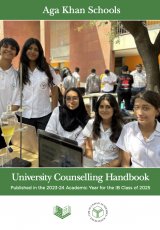Mombasa to Hyderabad
Though she was born in Kasama, Zambia, Naini’s parents moved to India when she was very young. Following in the footsteps of her father, who taught at the Aga Khan High School in Tanzania, Naini returned to Africa 30 years later in a professional capacity. “My husband accepted a job offer in Kenya; it was a very exciting move for me as I was going back to the continent where I was born.”
Naini was extremely pleased to have the opportunity to work with the Aga Khan Academies. “My youngest was ready to go into school, and I had a lot of time on my hands so was ready to rekindle my career. The Aga Khan Academy (AKA) seemed to me the best school to try and apply to as it was a lively, buzzing place, and I longed to be part of it.”
In-class language activityAn AKA teacher for over six years, Naini understands the need for institutions like the Academies to exist worldwide and foster pluralism. “In Mombasa, the school provides a mosaic of the rich diversity of the population. Children come from diverse cultural, ethnic, and religious backgrounds within the country, [as well as] from China, Italy, Russia, Canada, and India among others. Teaching in a multicultural environment enriches the curriculum. There was plenty of scope to talk about vital concepts such as acceptance, tolerance, and celebration of differences.”The Grade 4 teacher is now back in India and is teaching at the Academy in Hyderabad. She is enthusiastic about the coming years and believes that the Academy’s model for teaching will develop its students into successful global citizens. “The children in Hyderabad are new to the International Baccalaureate Primary Years Programme (PYP) but they love it! Whenever I talk to them, they are always keen to share how different and mundane their learning was in the other schools. Initially, they were afraid to answer questions, or take risks and do things in a different way; now the students are confident PYP practitioners. These bright young children show definite potential to be leaders in the community; they are ready to learn and lead.”
English literature lessonNow that there are two schools in operation and the AKA network has begun, teachers are able to take advantage of the opportunity to go on exchange and experience teaching in another Academy in a different part of the world. Naini agrees with the importance of having educators broaden their horizons. “The main advantage that a thriving exchange programme will bring to the Academies is the sense of unity among the staff. Reaching out and connecting with teachers across continents is sound pedagogy as it also creates a feeling of belonging to a wider community. Teachers encounter new cultures and meet new colleagues; they broaden their horizons [and] get a fantastic opportunity to learn about other [traditions] and religions. They become the bridge that links the Academies from ground level.”In addition to teaching, Naini is currently completing her Master's in Teacher Leadership at Walden University. It is obvious that she has not only successfully transitioned into her new position, but she is thriving and so are her students.
publications




